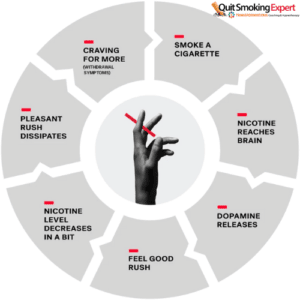Surprising Facts about Smoking and Your Mental Health
You probably know that quitting smoking reduces your risk for lung cancer, emphysema, and other physical ailments. However, you might be surprised to learn how much it can do for your  mental health. A recent review of research to date found that giving up the tobacco habit promotes positive feelings and mental wellbeing. More specifically, the study found a 24% lower risk of developing anxiety and depression and a 44% reduced risk of developing anxiety alone. These psychological benefits are another compelling reason to say goodbye to cigarettes. Find out more about how smoking affects your brain and tips for how to quit.
mental health. A recent review of research to date found that giving up the tobacco habit promotes positive feelings and mental wellbeing. More specifically, the study found a 24% lower risk of developing anxiety and depression and a 44% reduced risk of developing anxiety alone. These psychological benefits are another compelling reason to say goodbye to cigarettes. Find out more about how smoking affects your brain and tips for how to quit.
How Smoking Affects Your Mental Health
Adults with mental disorders are 2 to 4 times more likely to smoke. For some, it may be a way of self-medicating. Nicotine can make you feel happier and more relaxed. However, the effects wear off quickly and usually leave you feeling worse than when you started.
Consider these facts:
- Fight depression. While nicotine temporarily boosts dopamine levels, it also causes your brain to produce less of this chemical known as the happiness hormone. Some studies show that quitting smoking can be as effective as taking antidepressants.
- Reduce anxiety. Smoking also increases anxiety and tension. Find healthier strategies for managing stress. Exercise regularly and develop daily relaxation practices.
- Stay social. Are you concerned about how quitting smoking will affect your relationships? Your family, friends, and coworkers will probably like you even more without any second-hand smoke around.
How to Quit Smoking for Your Mental Wellbeing
Giving up tobacco may be more difficult when you’re dealing with mental health issues or a stressful lifestyle. You can still succeed with some effort and planning.
These strategies can help you leave nicotine behind:
- Consider your history. Adults with depression or similar conditions tend to smoke more cigarettes over a longer time than the average user. Consider booking a consult with one of our therapists to discuss your anxiety, stress, depression. Our unique trauma management program coupled with our quit smoking hypnosis will assist you to ‘get your life back’ free from both cigarettes and long term anxiety.
- Treat withdrawal symptoms. Conditions like depression also make you more vulnerable to addiction. If you choose to Quit smoking by going ‘cold turkey’ be prepared for symptoms including headaches, nausea, and irritability while you’re weaning yourself off nicotine. However, using hypnosis can eliminate all withdrawal symptoms and is quicker, easier and less painful.
- Alternatively, You could Try NRT. Nicotine replacement devices rarely interfere with antidepressants and other commonly prescribed drugs. Gum and patches could make your first weeks without cigarettes much more comfortable. Note: Champix is under review and should not be used at this time.
- Monitor medications. Talk with your doctor about your smoking cessation plans. There are drugs available to manage mental health issues after quitting cigarettes.
- Control food cravings. What about weight gain? Nicotine suppresses appetite, and you may find yourself snacking
 more as you look for something to do with your empty hands. Actually, the main reason that you want to snack after quitting smoking is due to missing the ‘sugar hit’ you get when smoking. 20% of the ingredients in cigarettes is SUGAR. What is the most addictive substance on the planet? Yes, Sugar. Ask us for our tip on how to stop ‘sugar cravings’ it is really very easy to do.
more as you look for something to do with your empty hands. Actually, the main reason that you want to snack after quitting smoking is due to missing the ‘sugar hit’ you get when smoking. 20% of the ingredients in cigarettes is SUGAR. What is the most addictive substance on the planet? Yes, Sugar. Ask us for our tip on how to stop ‘sugar cravings’ it is really very easy to do. - Plan to Succeed. Successful non-smokers have usually tried ‘conventional’ ways and had multiple attempts before they realise the secret to quitting completely. So don’t worry if you have tried to quit in the past, If you want to stop smoking cigarettes for good, Book an appointment with a quit smoking expert and discuss using hypnotherapy to stop smoking for good.
Giving up cigarettes is one of the most important things you can do for your overall wellbeing, and the health benefits appear almost immediately. You’ll be protecting your mind, as well as your heart and lungs when you become tobacco-free.

 more as you look for something to do with your empty hands. Actually, the main reason that you want to snack after quitting smoking is due to missing the ‘sugar hit’ you get when smoking. 20% of the ingredients in cigarettes is SUGAR. What is the most addictive substance on the planet? Yes, Sugar.
more as you look for something to do with your empty hands. Actually, the main reason that you want to snack after quitting smoking is due to missing the ‘sugar hit’ you get when smoking. 20% of the ingredients in cigarettes is SUGAR. What is the most addictive substance on the planet? Yes, Sugar.